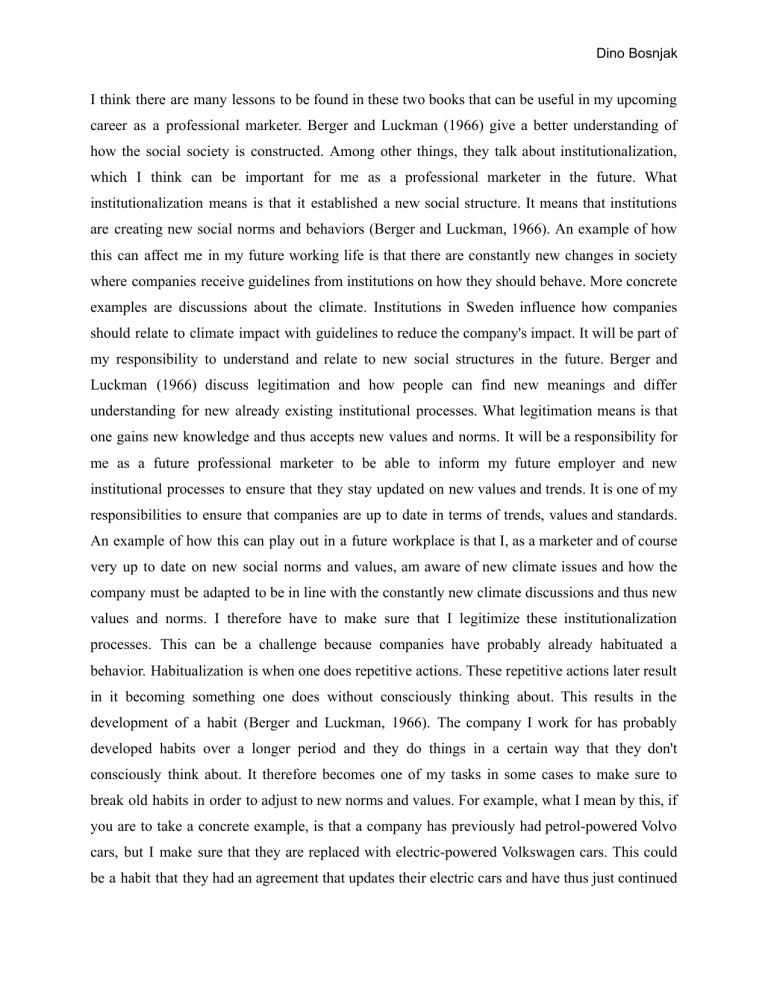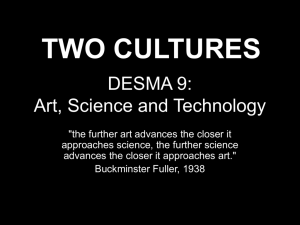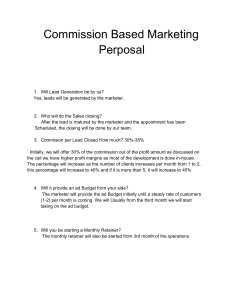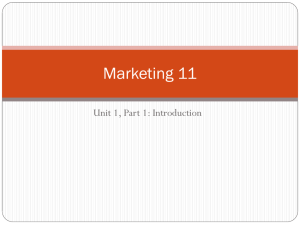
Dino Bosnjak I think there are many lessons to be found in these two books that can be useful in my upcoming career as a professional marketer. Berger and Luckman (1966) give a better understanding of how the social society is constructed. Among other things, they talk about institutionalization, which I think can be important for me as a professional marketer in the future. What institutionalization means is that it established a new social structure. It means that institutions are creating new social norms and behaviors (Berger and Luckman, 1966). An example of how this can affect me in my future working life is that there are constantly new changes in society where companies receive guidelines from institutions on how they should behave. More concrete examples are discussions about the climate. Institutions in Sweden influence how companies should relate to climate impact with guidelines to reduce the company's impact. It will be part of my responsibility to understand and relate to new social structures in the future. Berger and Luckman (1966) discuss legitimation and how people can find new meanings and differ understanding for new already existing institutional processes. What legitimation means is that one gains new knowledge and thus accepts new values and norms. It will be a responsibility for me as a future professional marketer to be able to inform my future employer and new institutional processes to ensure that they stay updated on new values and trends. It is one of my responsibilities to ensure that companies are up to date in terms of trends, values and standards. An example of how this can play out in a future workplace is that I, as a marketer and of course very up to date on new social norms and values, am aware of new climate issues and how the company must be adapted to be in line with the constantly new climate discussions and thus new values and norms. I therefore have to make sure that I legitimize these institutionalization processes. This can be a challenge because companies have probably already habituated a behavior. Habitualization is when one does repetitive actions. These repetitive actions later result in it becoming something one does without consciously thinking about. This results in the development of a habit (Berger and Luckman, 1966). The company I work for has probably developed habits over a longer period and they do things in a certain way that they don't consciously think about. It therefore becomes one of my tasks in some cases to make sure to break old habits in order to adjust to new norms and values. For example, what I mean by this, if you are to take a concrete example, is that a company has previously had petrol-powered Volvo cars, but I make sure that they are replaced with electric-powered Volkswagen cars. This could be a habit that they had an agreement that updates their electric cars and have thus just continued Dino Bosnjak with it. I see to it that a new agreement is procured with electric cars instead and that brings some change because they need to be charged and a charging station needs to be installed but it is in line with social values because they are environmentally friendly. There are also lessons to be learned from Popper that will be useful for me in my future career as a professional marketer. Popper (1959) talks about falsifiability and that theories should be able to be tested. They should be able to be tested so they could potentially be falsified. This is an approach so that you can never verify that a theory is completely true. This is an approach that can be useful to me as a professional marketer. This is because you shouldn't assume that things are completely true, by this I mean that within the job and the company you might have a way of doing things. There may probably be situations where you think you assume that one approach is the best without having tested it in comparison with other approaches. I can use Popper's view to constantly try to develop the business by testing new approaches. The problem of induction is something that is discussed by Popper (1959). What is the problem is that with universal statements and their validity of truth when it is based on previous experiences. It is that they cannot be considered to be universally true. As a marketer, I can use this to understand that something can never be classified as the right approach. What is meant by this is that it is common in organizations to have a way of getting things done. It may be that the way they have done things in the past has produced good results and therefore they may assume that this is the right way to do it. I had therefore questioned the truth behind this and whether it is the best way to do things. Therefore, I had constantly tested new methods and constantly made an attempt to be able to develop better strategies. But at the same time, I am aware that it is not possible to just test as much as possible because it probably costs resources for the company and therefore I would have compared the degree of falsifiability of two different alternatives. The degree of falsifiability is a logical possibility method where you compare the degree of falsifiability between two alternatives where the alternative with the lowest falsifiability degree has the greatest possibility of occurring (Popper, 1959). I had done that in order to be able to have better possibilities for my newly tested methods to show positive results. Thus, I will not be an inductivist, which means that I draw conclusions about how something will play out in the future based on past results (Popper, 1959). I will instead have a deductivism perspective which is the opposite and means that one will critically test theories which emphasize on falsifiability of theories (Popper, 1959). Dino Bosnjak Referencelist Berger, Peter L, and Thomas Luckmann. (1966) The Social Construction of Reality: A Treatise in the Sociology of Knowledge. New York, Open Road Media Popper, K. R. (1959). The Logic of Scientific Discovery. Routledge.




